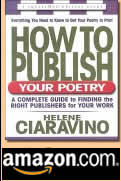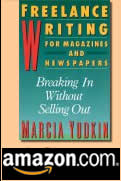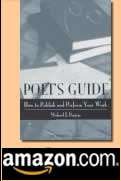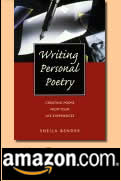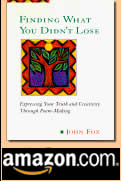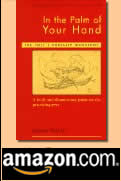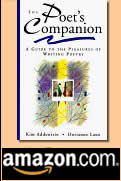|

Check out these awesome books for sale thru our affiliates! Read all about
it here, then click thru to make your purchase. Your click-thru-purchase
will give a percent of the sale to Mrs. Duck. You know you love to shop
online anyway-- so why not do it here where you are doing a good deed
at the same time? But you have to click-thru-purchase from here for it
to work!

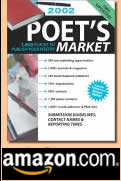 |
Poetry brings words to life with truth and passion unequaled by
ordinary fiction. It awakens the senses, evokes powerful moods and
moments in time. Get your poetry published with 2002 Poet's Market!
It helps define and direct your efforts with listings for more than
1,800 book, journal and magazine publishers and editors. You'll
also find information on grants, conferences, workshops, contests
and more.
|

|
Great guide no matter where you are in your career. She gives walk
throughs and tips along the way. Nice resource.
|
|


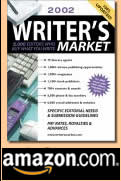 |
Get published and get PAID for it with 2000 Writer's Market! Inside
you'll find more than 4,000 up-to-date leads, featuring consumer
and trade magazines, book publishers, script buyers and more. Using
easy-to-reference symbols and indexes, you'll quickly target your
most promising market opportunities among listings that provide
all the critical submission information you need.
|

|
Unlike the mass of freelance writing books aimed at readers who
fondly hope to become wealthy freelance writers any which way they
can, Freelance Wiling: Breaking In Without Selling Out is for educated
people whose primary motivation for trying to get into print is
the wish to effectively communicate their ideas, skills and discoveries
in appropriate publications. Few books are directed to the potential
writer who wants to follow his or her own path. If fulfilling your
sense of responsibility to your subject, to your audience, and to
yourself is important to your satisfaction as a writer, Marcia Yudkin's
concise and sensible handbook is for you.
|
|


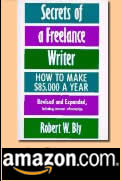 |
Dozens of high-paying, commercial writing projects are available.
These include ads, annual reports, brochures, catalogs, newsletters,
direct-mail packages, audiovisual presentations, and other promotional
pieces. This new, fully revised edition of Bob Bly's invaluable
resource tells how to tap these lucrative but lesser known markets.
Has been called the "Freelancer's Bible."
|

|
Bugeja is the former poetry columnist for Writer's Digest , as well
as a poet in his own right, and he's assembled an invaluable package
of information for the bard who knows verse can't be taught -- it
can't -- but wants the goods on organizing and publicizing readings,
compiling chapbooks, submitting to magazines, negotiating with editors,
etc. It may not be art, but it's vital, because, as Bugeja notes
in his preface, "... I stopped believing good work speaks for
itself... (it) speaks for itself in front of the right editor."
Here's how to find her.
|
|


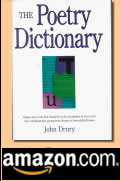 |
John Drury's Poetry Dictionary is no dreary list of defined terms
to cram for your poetry final. It's a work of art in itself, written
in Drury's engagingly lucid prose, liberally spiced with examples
from the world's best poets. Curious about sequence? Drury gives
a clear definition of the term, followed by Katha Pollitt's "Vegetable
Poems" in sequence 1-5. Forgotten the rules of the villanelle?
Drury explains the form, gives a little historic background, and
presents examples by Jean Passerat, Edwin Arlington Robinson, Dylan
Thomas, Weldon Kees, and James Cummins. Never has a poetry dictionary
been so browsable, so erudite, and so engaging. --Stephanie Gold
as quoted on Amazon.com
|

|
Beginning with "12 Things You Can Do to Help Yourself Write
Poetry," Sheila Bender shows aspiring poets how to peel away
their inhibitions and get in touch with their deepest, truest feelings.
Encouraging readers to write everything from dream journals and
postcards to lists and clustered phrases, Bender gently teaches
them to use words that show instead of tell, while guiding them
to avoid general words that "categorize" how they feel.
As readers progress, they'll begin to sculpt poems out of the words
and phrases they've collected, using sensory details, simile and
metaphor to create rich, evocative images.
|
|


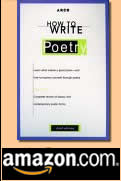 |
A very thin, unpretentious book that gives you tools, practice,
and examples in the craft of poetry without getting extremely analytical...Practical
exercises are dotted liberally throughout the book. No theory is
introduced without lots and lots of hands-on application...It makes
a valuable starter book, a valuable reference book (for forms, meter,
etc.), and a valuable exercise book for ongoing poetry calisthenics.
--Anitra Dancing, Speakeasy, as quoted on Amazon.com
|

|
Poetry discovers and speaks a truth ordinary language cannot express.
Poet-teacher Fox reveals how imagery, sound, methaphor, rhythm and
other poetic elements can help us tell our inner story, heal psychological
wounds, discover spiritual connection, and develop the rich creative
imagination that lies within us all.
|
|


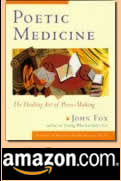 |
Powerful and exciting, Poetic Medicines illustrates the unique role
that poem-making can have in addressing the situations that lead
us to renewal in our lives. This book is a MUST HAVE for anyone
doing any sort of greif and healing work thru Poetry. If you are
even remotely interested in Poetry Therapy, the discipline and application
of it, then you have to read this book.
|

|
The
Poet's Portible Workshop
Steve Kowit believes, and rightly so, that poetry should show, not
tell. The same could be said for good teaching, which is what makes
this volume so remarkable. In In the Palm of Your Hand Kowit employs
more than 100 poems and excerpts to illustrate his discussions on
everything from metaphor to meter to metaphysics. Working your way
through this book--and it is work--is like sitting in on a terrific
creative-writing seminar, minus the criticism (both constructive
and destructive) of fellow students. If you go by the book, you'll
have written at least 69 poems by the end. Because of its explication
of the basic tenets of poetry, In the Palm of Your Hand might be
mistaken for a beginners' book only. That would be a shame. There
are so many good ideas here that more experienced poets won't want
to miss out; Kowit has lots of exciting ways to invigorate one's
writing. (Here's a favorite quick tip: "A good rule of thumb
is never to use a word that you're proud of.") In the Palm
of Your Hand is also recommended for members of writing groups who
are interested in imposing some kind of structure on their meetings.
|
|


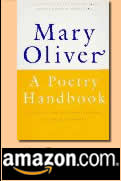 |
This slender guide by Mary Oliver deserves a place on the shelves
of any budding poet. In clear, accessible prose, Oliver (winner
of both the Pulitzer Prize and the National Book Award for poetry)
arms the reader with an understanding of the technical aspects of
poetry writing. Her lessons on sound, line (length, meter, breaks),
poetic forms (and lack thereof), tone, imagery, and revision are
illustrated by a handful of wonderful poems (too bad Oliver was
so modest as to not include her own). What could have been a dry
account is infused throughout with Oliver's passion for her subject,
which she describes as "a kind of possible love affair between
something like the heart (that courageous but also shy factory of
emotion) and the learned skills of the conscious mind." One
comes away from this volume feeling both empowered and daunted.
Writing poetry is good, hard work.
|

|
"We wanted to create a book," say poets Kim Addonizio
and Dorianne Laux in their introduction to The Poet's Companion,
"that would focus on both craft and process." The book
they have created is an impassioned exploration of poetry writing
that addresses subject matter, craft, and the writing life. The
reigning wisdom is that poets, like other creative writers, should
write what they know. "The trick," say the authors, "is
to find out what we know, challenge what we know, own what we know,
and then give it away in language." Elsewhere they add that,
while "as poets, we need to write from our experience ... that
experience may be mental, emotional, and imaginative as well as
physical."
|
|


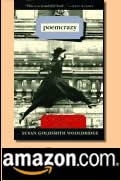 |
Poemcrazy is the poetic analog to Anne Lamott's Bird by Bird or
Natalie Goldberg's Writing Down the Bones, two classic works on
how to forget that you "can't write" and just start the
pen moving. Susan Wooldridge is a swimming instructor in the wide
ocean of language, encouraging us to move ever farther from the
shore, dive deep, and dance on the waves.
|

|
|
Click through here to search for any title or item at Amazon.com.
When you click through and shop at Amazon from here, up to 5% of
your purchase will come back to support Mrs. Duck! You're going
to shop anyway. Why not have your dollars do good deeds by clicking
through from here to shop?!
|
|
![]()
![]()


![]()
![]()


![]()
![]()


![]()
![]()


![]()
![]()


![]()
![]()


![]()
![]()


![]()
![]()


![]()
